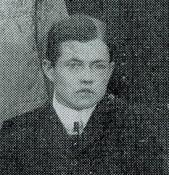
|
The King's School Canterbury |
Roll of Honour |
| Chaplain 4th Class Harry Lawrence DIBBEN | |
|
Army Chaplains Department Date of birth: 23rd May 1887 Date of death: 1st January 1918 Died aged 30 Commemorated at St Theobald and St Chad Church Caldecote, 2 miles north of Nuneaton in Warwickshire |

|
| He was born at Timperly in Cheshire on the 23rd of May 1887, the only son of the Reverend John Arthur Dibben MA (OKS), Vicar of Astley Woulds, and Eliza Barbara of The Vicarage, Astley Woulds in Warwickshire. He was christened at Timperley on the 19th of June 1887. He was educated at the Junior King's School from September 1897 and at the King's School Canterbury from September 1900 to August 1906. He was appointed as a monitor in 1904 and was awarded his sports colours in 1906. In 1906 he was awarded the Ford Studentship for Theology to Trinity College, Oxford, and the Squire University Scholarship for Theology in 1907. In 1908 he gained a 2nd Class in Classical Mods and a 3rd Class BA in humanities in 1910. He was ordained as a Deacon in December 1911 and was curate at St Matthews Bolton in 1911/12, then curate at St Paul's Kersal near Manchester in 1912/13, before becoming assistant master at Packwood Haugh Preparatory School in 1913 and in 1915 at Boxgrove School, Guildford. In May 1915 he applied for a commission in the Army Chaplains Department and, in a letter dated the 15th of May, he was informed that he had been accepted for service and that he was to report the senior Church of England Chaplain at Aldershot. He was granted the rank of Chaplain 4th Class on the 18th of May 1915, underwent a medical examination the following day at Cambridge Hospital, Aldershot and was passed fit for overseas service. He went to France but had to return home due to ill health and was the subject of a Medical Board held at D Block, Royal Victoria Hospital, Netley on the 5th of March 1916, which concluded:- "He is suffering from neurasthenia the result of continued strain in active service." He was granted three months leave and resigned his commission on the 18th of May 1916. After recovering, he spent much of his spare time helping boys clubs in the Birmingham Street Children's Union which was a union of around seventy boys and girls clubs. In 1917 he began work at a Leicestershire mining village and lived at Main Street in Overseal. He was killed accidently whilst travelling to visit a signalman on the line in his parish. An OKS wrote this appreciation of his life which was reproduced in the Cantuarian:- "He was devoted to the school. The son of an OKS, he always upheld the glory of it and made us see it when we forgot to look. He was no great athlete, but he was very keen. Perhaps his happiest days were in the Parrots when he scored for the first eleven. He was not brilliant at books, but his careful work brought him his reward in a Ford Studentship at Trinity College, Oxford. He loved the country and to his initiative were due many splendid long walks- as when occasionally a late service in the cathedral on a Sunday evening gave enough time to walk to Whitstable and back-on Ascension Day gave time to walk to Folkestone. At Oxford he still kept alive in us the spirit of the old school. After his ordination he plunged without any thought of his own health into the difficulties of life in a large parish. All his life he had learned to fight and to love, so that it seemed impossible to keep him back when there was need of chaplains at the front. There too, as at the school where he had been a master he gained the respect and affection of the men whom he served. He came home weary and ill but with patience and faithfulness he fought his way back to health. Much of his spare time he gave to helping boys in Clubs of the Birmingham Street Children's Union, where many a boy and fellow worker will feel the sense of a deep personal loss. Last year he began work in a mining village in Leicestershire. It was here that perhaps he showed how infectious is real affection, for those were the happiest months of his life. He must have often prepared himself for sudden death at the front as he prepared others, but it was in going to visit a signalman on the line in his parish that death came to him and a call to new life. For his was a life of many happiness's and clean wholesome beauty. Faithful to his friends, faithful to his school, he lived to serve." He is commemorated on a brass plaque in the chancel of St Matthew's Church, Overseal. As he had left the army when he was killed his death is not commemorated by the Commonwealth War Graves Commission. |
|
Back